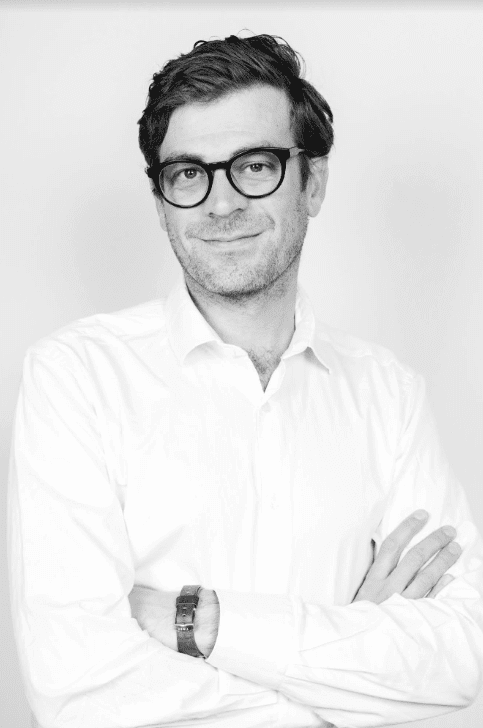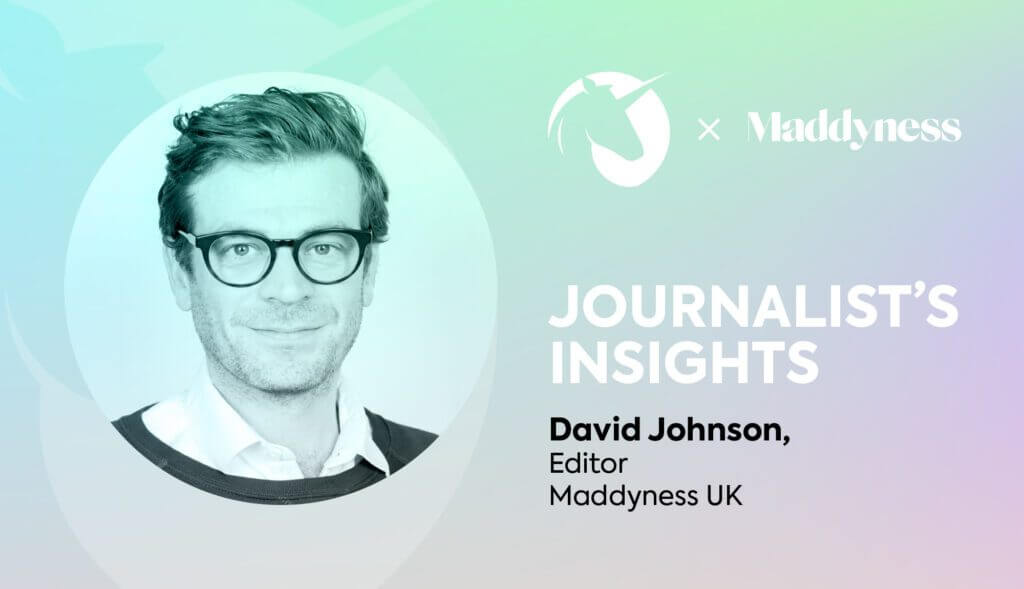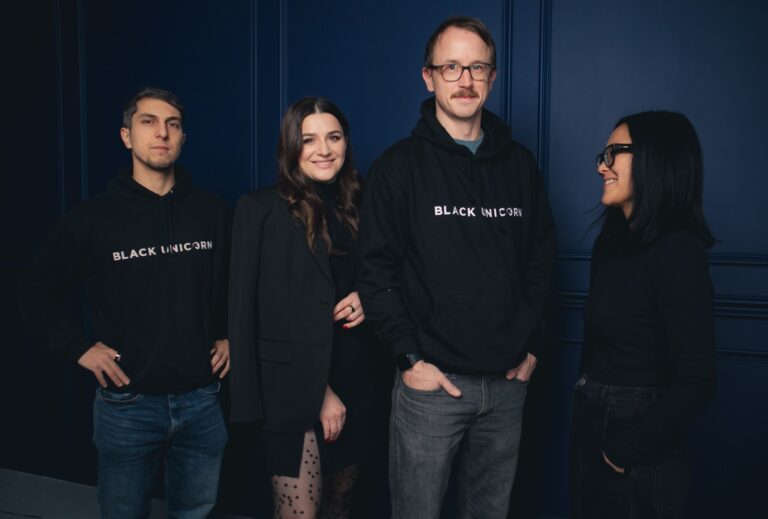In case you weren’t aware, the UK tech industry has the privilege of featuring one of the freshest brands in startup and tech media: Maddyness. As the UK counterpart of the French OG publication, Maddyness UK offers an array of content for inspiration, advice, trends, and practical tools for both seasoned startup experts and newbies. While the focus includes funding and the role of tech startups is paramount, the scope is extends beyond tech. We spoke to David Johnson, the British mind behind the French brand’s UK presence, to find out more about him and the story behind Maddyness.
About Maddyness and David’s story
Where are you from and where are you based?
David Johnson: I was born in Northampton and after 9 house moves found myself growing up in St. Albans, before moving to London the day I finished my A-Levels. Then a bit of back and forth between Paris and London before making the Covid-inspired move to the West Berkshire countryside, less than an hour from Paddington and within spitting distance of the M4 with all the perks of nature and space.
What are some of your favourite and less favourite things about living in London?
DJ: Despite moving out of the capital I still consider myself a Londoner. I love that I can go to the same sandwich shop (Italia Uno, Charlotte St.) and know that I can get the same thing I did 25 years ago without having to ask.
The rate and pace of change in the city makes me less comfortable, as so many of my navigational points of interest have changed. “Meet you at Kettners now requires a SohoHouse membership.”
What’s the path that brought you to the world of journalism?
DJ: A long and winding road that began with books as a reader then a long career in bookselling, from a Saturday job to owner of my own bookshop, via supplying 50,000 books to a library in Libya. Ultimately the closure of my niche specialist bookshop in one of the most expensive postcodes in London led to me looking for a new direction helping French startups develop in the UK.
And how did you end up joining Maddyness?
DJ: I met the founders of Maddyness when they first embarked on their international expansion. The first task was to help them draft a job description to find a country manager to lead the project – it was too good an opportunity and I suggested I join the team rather than writing the job description.
What is Maddyness about? How (if at all) does Maddyness UK differ from the French edition?
DJ: The French platform has various features and developments that make it more than a pure platform for content and features, including MaddyPlay, the ‘Netflix for startups and entrepreneurs’. They also have the luxury of having launched at the same time as the French startup ecosystem.
Whereas in the UK, we launched when the UK ecosystem was already well-established with lots of other related media outlets. The visual grammar and experience however remain completely comparable giving us a strong international Maddyness brand and universe.
What is your role today at Maddyness?
DJ: Editor in Chief, which involves callously batting away approaches, embracing approaches with thought and insight, commissioning content fit for our agenda and always working on strategic and speculative partnerships.

Work life at Maddyness and PR advice
What things about startups make them newsworthy, in your opinion?
David Johnson: This is a really hard one to define, much like defining what a startup is. If the business, concept, service is genuinely new or fundamentally innovative and/or disruptive in an existing business there is news. If the founder(s) have a captivating backstory it can sometimes be as interesting as their visionary visions for the future. Raising money is news, but only as a small, almost anecdotal chapter in the wider journey.
What hygiene elements do startups need to have before considering any PR activity, in your opinion?
DJ: As a journalist rather than PR I’d say they need nothing more than a story or vision to share and something approaching an ability to articulate it. That said, when working via PR it is essential to have a solid online presence for the company and founding team, and always do more rather than less when it comes to photos.
What does your day look like on average?
DJ: Produce content, play with Canva, check my Eurostar loyalty balance, read as much as possible, check in with the team, stop for lunch if I’m lucky.
How busy is your inbox and how do you manage it?
DJ: Busy, too busy. If I like what I see come through in the morning I generally snooze to the following day to start the day. Then I will usually get side-tracked by something compelling and focus on that.
Is the press release dead? How do you prefer to receive information about news?
DJ: I don’t think so, it can certainly be tired of flagging, but for me to have (just about) everything I need in one place, crafted by a good PR who has been working closely with their client is priceless. But of course, that’s just the beginning, so as a tool to get my attention I like them.
They also come almost exclusively by email, which I like, I already have too many channels and mediums to juggle communication.
What do the best pitches you’ve received have in common?
DJ: Direct, engaging, impact and meaning in the news, and humility from the sender. An element of flexibility is always welcome – anything that comes across as having even a suggestion of ultimatum or do this on our, or our clients terms is a turn off. I’m unlikely to be able to drop other things to play by your tune.
What’s a weird or unusual pitch that worked?
DJ: Posh noodles was a good one, and more recently a pitch from two teenager girls building a business making cricket whites for girls. Ticked a huge amount of personal and professional boxes.
What is your biggest pet peeve about PRs or the PR industry?
DJ: A lot can feel very coldly transactional, send email, send chaser, phone to harass.. I know I add to it by not responding 100% of the time. If you don’t get a response you probably don’t need to chase.
Not about the PR industry as such, but as we endeavour to be inclusive and diverse receiving back-to-back investment news from exclusively male-founded teams is a real turn off and can be demoralising.
I don’t like having to tell people I will respect an embargo – it’s a waste of an email from me and an unnecessary extra step in the dialogue. Journalists respect embargos, and if they don’t it’s probably not the end of the world.
I also dislike the false sincerity and enthusiasm that poor PR folk have to adopt when sending out releases (usually about new appointments) that are really not newsworthy.
The best PR pros work in which ways?
DJ: They are direct, open to hearing the journalist/editors thoughts, and have done as much of the hard work themselves to present something polished, relevant and newsworthy.
Know your stuff, know your journalists, build a relationship so even if the exchange is transactional, it’s based on mutual respect and understanding.

Personal-ish questions
What stories do you enjoy writing about the most?
David Johnson: Genuine innovation and impact and giving editorial space to people of diverse backgrounds. My personal rule is ABF – Anything But Fintech, although realistically this is very hard to stick to in my role reporting on startups in the UK!
What excites you in the world of startups?
DJ: New business models, the rate of progress and the innate “abili-gility” startups have to change, pivot and reinvent.
If you were to start a startup, what would it be?
DJ: I’ve always wanted to re-open a bricks and mortar shop, open by appointment, inside there would be some nice books and stationary and maybe a bit of art, but the whole concept would be hidden behind lots of smoke and mirrors to suggest so much more is available hence the extremely high monthly fee to have the right to make an appointment.
Wrapping it up
What does the future hold for Maddyness UK?
David Johnson: We will soon be launching the new look website to bring us in line with the French platform, bring a cleaner and content rich experience, we are also reporting more on VCs and LPs. We are also doubling down on our unique position to report on the space between the French and British startup ecosystem and exploring where our next office should be…
Favourite holiday type?
DJ: Swiss Alps, snowboarding… I’m trying to work out a way of going on a holiday that my family thinks is a business trip and business thinks I’m on annual leave… leaving me free for some me time.
DJ: Favourite cuisine?
Japanese, but French Japanese… especially the cheese stuffed beef yakitori.
DJ: Where might one find you on a weekend?
Shopping with my teenage daughters in Glossier, building Lego with our youngest daughter or up a ladder or some other precarious situation for the sake of DIY.
How do you see AI changing media in the next few years and what do you think media will look like in the medium/longer term future?
DJ: This is the question. AI is already changing media, as much behind the scenes as in the headlines. It’s a bit hackneyed but like most industries there are huge benefits coming from AI that need to be embraced to enhance productivity. In the media the debate will centre around truth. As much as there is a great potential for AI to deliver truth via statistics and figures readers are always going to prefer to seek truth from recognised or reputable (i.e. human) sources.
In the future I see two trends, some consumers of media will double-down on longer form content, printed and read in caves by candlelight, and others will prefer increasingly short form ad-rich content pushed via as many channels and devices as possible, as quickly and frequently as possible.
Enjoyed the interview with David? Check out the rest of our blog and our Journalist’s Insights series:
Ioanna Lykiardopoulou from The Next Web
Startups, the Media and CEE with Zosia Wanat from Sifted
Connecting the European startup scene with Patricia Allen of EU-Startups
Busting Journalism Myths with Lindsay Dodgson from Business Insider
Diving into fintech journalism with Doug Mackenzie from Fintech Finance
Securing media placements during COVID-19 with Yessi Bello-Perez from The Next Web
From PR to Media With Remco Janssen of Silicon Canals
The importance of regional media for startups, with Anda Asere from Labs of Latvia



